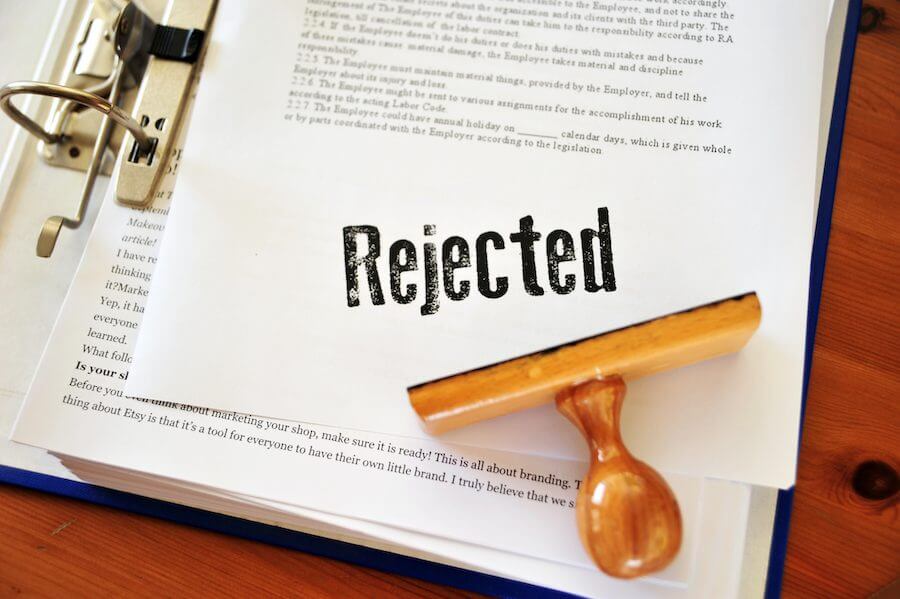A college rejection letter is the formal letter applicants receive notifying them that they are not being considered for admission into the college.
Usually received by mail or email, they are typically short, straightforward, and informational. The responsibility of receiving admission applications and making college admission decisions is not one to be taken lightly. However difficult, it is the responsibility of the administration to inform applicants when they haven’t been admitted. When considering how much time and effort each student puts into their application, it is the administration’s duty to respect this effort with a polite, empathetic, but clear message of denial.
Free Downloads (Samples & Examples)
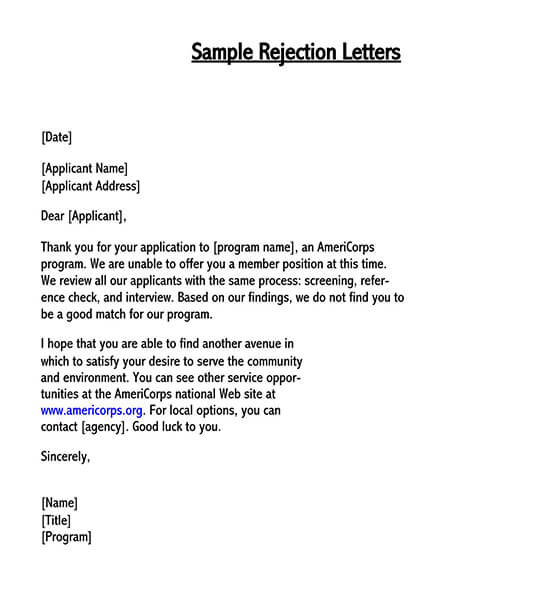
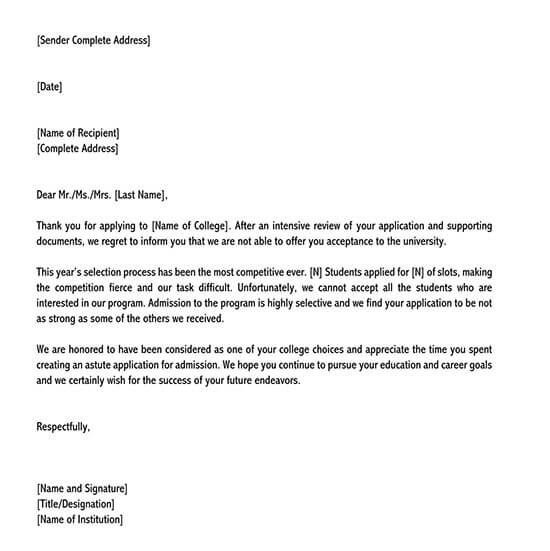
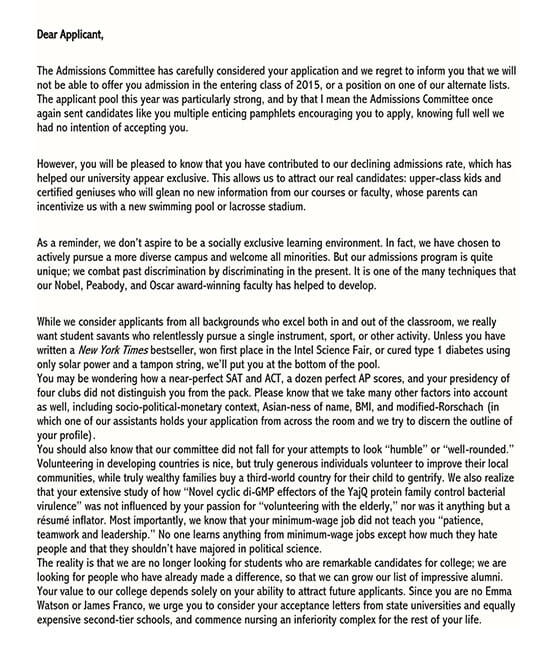
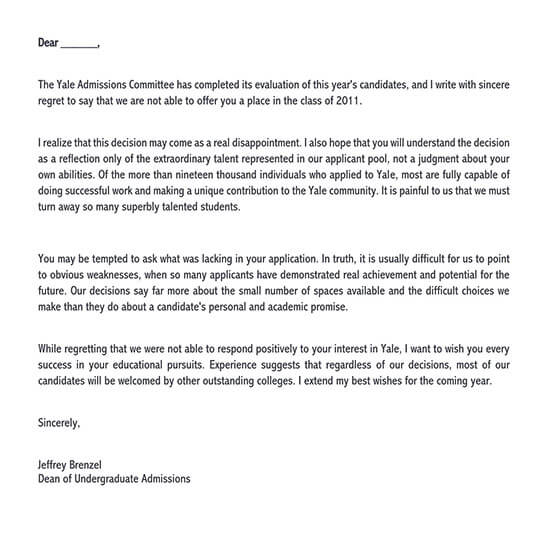
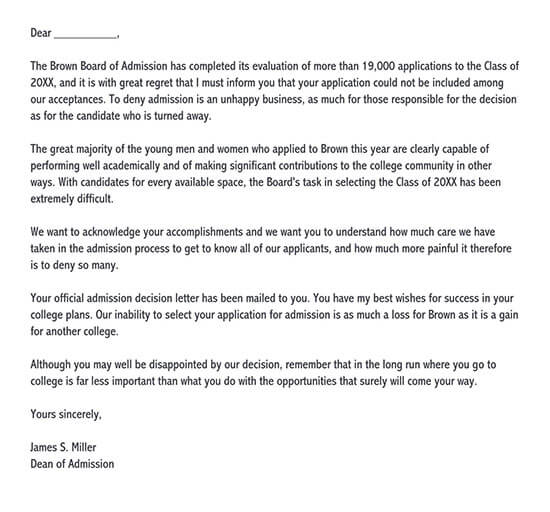
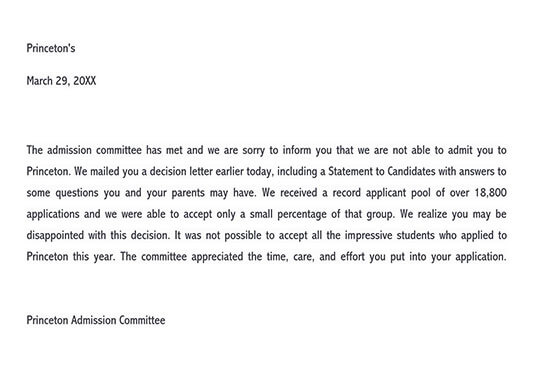
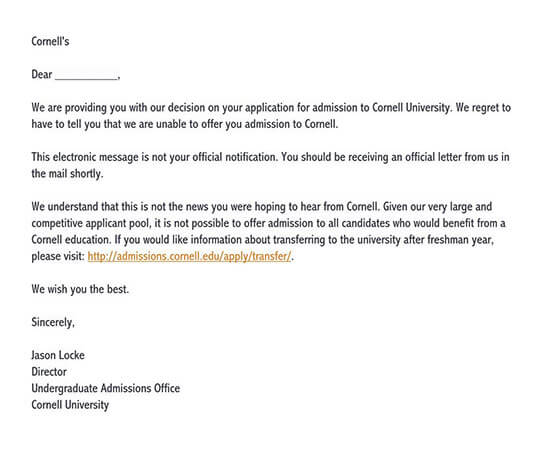
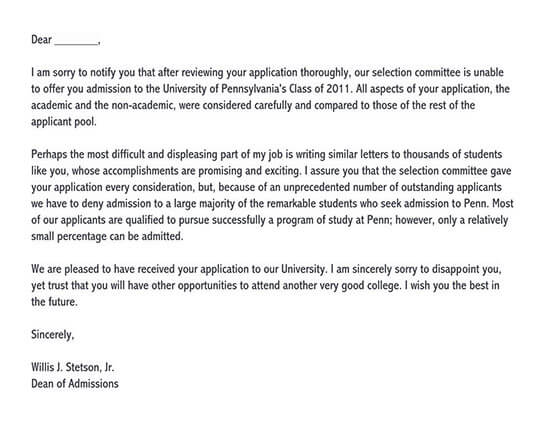
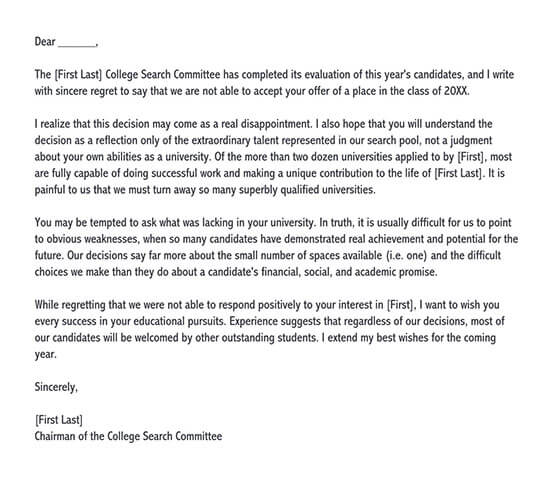
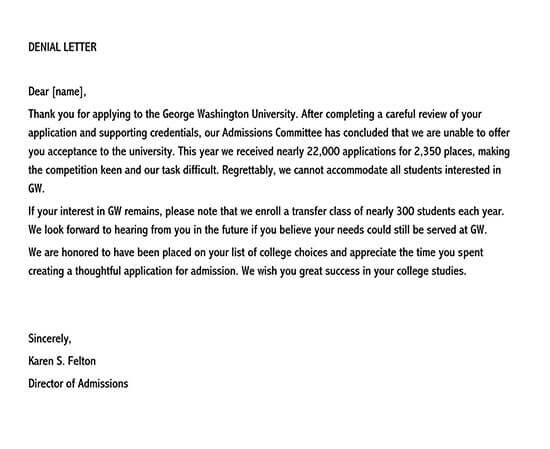
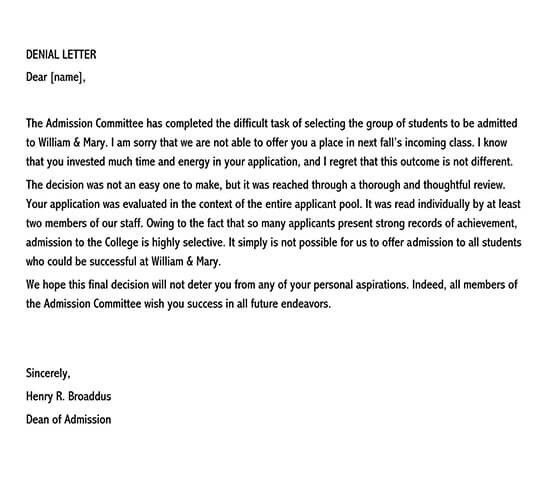
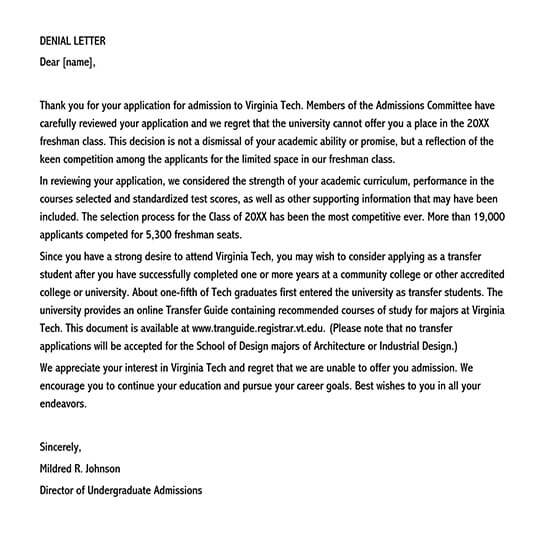
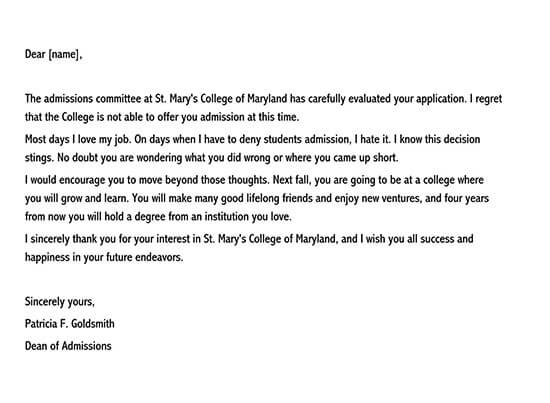
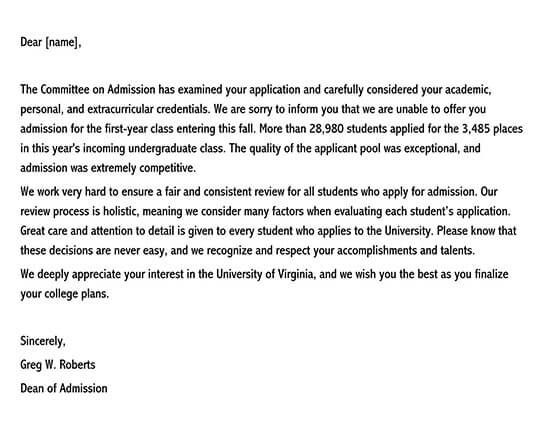
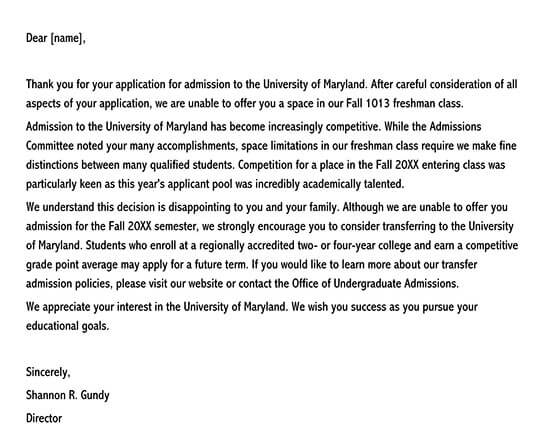
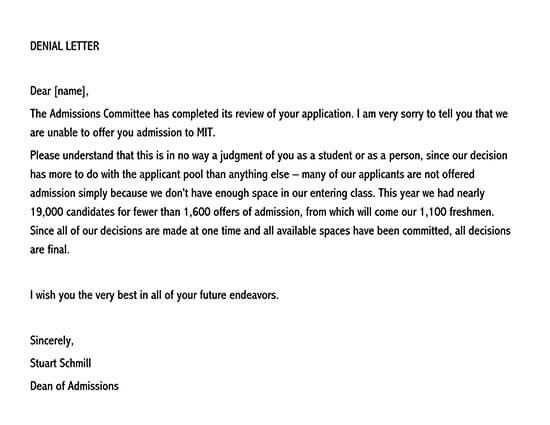
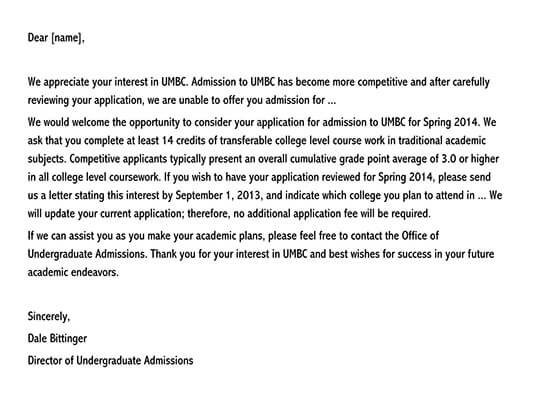
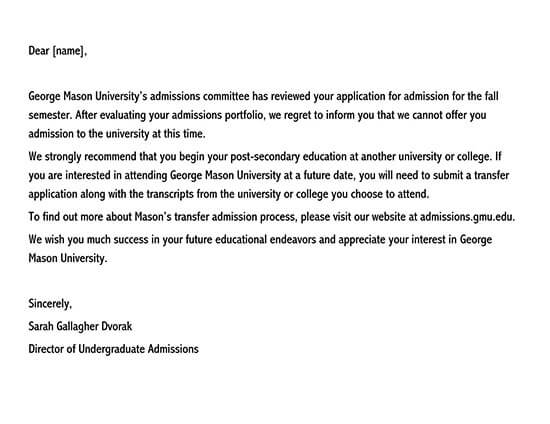
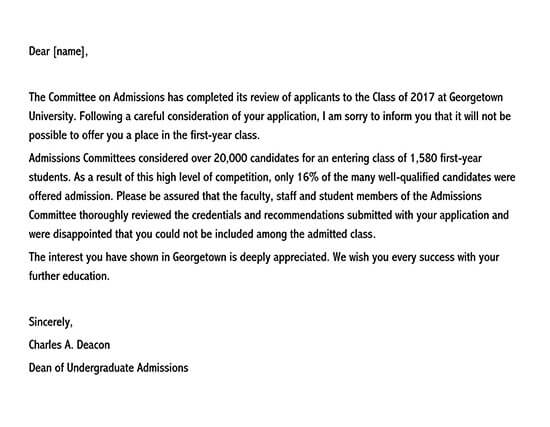
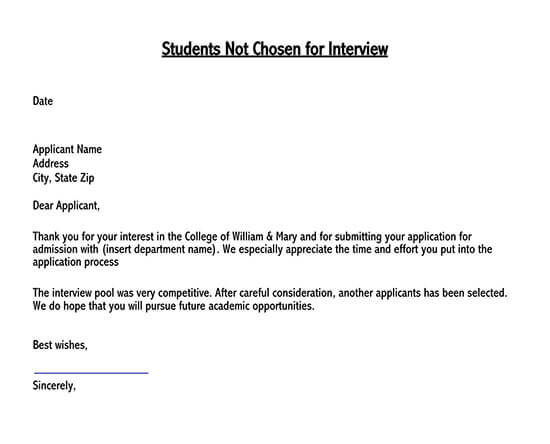
How to Write (Format) a College Rejection Letter?
A rejection letter is usually written in a business letter format. A standard college rejection letter should include the following:
Opening
The letter should begin with a salutation to the student. The letter should not hesitate or wait to inform the student that they have not been accepted, and the notice of denial should be included within the first few sentences of the letter. Since the chances are your university is empathetic to the difficulty of rejection, it’s best to use language like “We regret to inform you” or “Regretfully”, to show your sympathy. It’s best to follow this with recognition of the student’s time, effort, and accomplishments despite not being accepted. The student should be thanked for their hard work and effort, and for choosing to apply to your university.
Body
Next, letters typically justify the denial by talking about the competition seen in the applicant pool. This section assures students that your decision was not easily reached and that the number of students who could be admitted was limited.
Closing
Lastly, you should congratulate the student on their academic accomplishments, encourage them to continue to excel and wish them the best of luck in their future. Close with a standard “Sincerely” or “Best”, leave a few lines of space for a signature, and type your name at the bottom of the letter.
Template College Rejection Letter
[College/University Letterhead]
[Date]
[Applicant’s Name]
[Applicant’s Address]
[City, State, Zip]
Dear [Applicant’s Name],
I hope this letter finds you well. On behalf of the admissions committee at [College/University Name], I want to thank you for your interest in our institution and for the effort and dedication you have shown in your application.
After careful consideration and thorough review of numerous applications, we regret to inform you that we are unable to offer you admission to the [Program Name] for the [academic year/semester]. This decision was not easy and reflects the competitive nature of this year’s applicant pool rather than any shortcomings in your application.
We recognize that this news may be disappointing. Please understand that this decision does not diminish the strengths and achievements you have demonstrated in your application. Our admissions process is highly competitive, and we must make difficult decisions among a large number of talented applicants. We are limited not by the quality of our applicants but by the number of students we can accept each year.
While we are unable to offer you admission at this time, we encourage you to consider applying again in the future should your interest in [College/University Name] persist. Additionally, we wish to support you in your educational journey and suggest exploring other excellent institutions that may offer programs aligned with your interests and goals.
We appreciate the time and effort you invested in your application and wish you the best in your academic pursuits and future endeavors. If you have any questions or require further information, please do not hesitate to contact our admissions office.
Thank you again for considering [College/University Name] as a potential step in your academic career. We are confident that you will find success in your future educational endeavors and hope that you continue to pursue your passions with the same dedication and enthusiasm you have shown in your application.
Sincerely,
[Signature (if sending by mail)]
[Name of the Admission Officer]
[Title]
[Contact Information]
[College/University Name]
Sample College Rejection Letter
Dear Taylor Rivera,
Greetings from Dream University. We are reaching out to you after a thorough and careful review of your application for the Fall 20XX semester.
We understand the time, effort, and hopes you invested in your application to Dream University. We regretfully notify you that we are unable to grant you admission for the upcoming semester. The selection process was incredibly challenging this year, given the sheer volume of talented and qualified candidates. Please know that this decision is not a reflection of your abilities or potential.
Each year, we face the difficult task of making decisions from a pool of candidates who have demonstrated high academic achievement, leadership, and community engagement. Unfortunately, due to the limited number of spaces available in our programs, we are unable to accept many exceptional students.
We encourage you not to view this as a setback in your academic journey. Many successful individuals have faced similar challenges and have gone on to achieve great things. Your application has shown us your potential, and we believe in your ability to succeed wherever you choose to go.
While Dream University will not be part of your path this year, we hope you will continue to pursue your academic and personal goals with the same enthusiasm and determination you have shown. There are numerous institutions and opportunities that can offer you the chance to grow and excel in your field of interest.
Should you wish to seek feedback or advice on future applications, our admissions counselors are here to help. We also welcome you to apply again in the future, as your continued growth and experience could strengthen your candidacy.
Thank you for considering Dream University as a potential step in your educational journey. We wish you the very best in your future endeavors and are confident you will find a college that is the right fit for you.
Warmest regards,
Alex Johnson
Admissions Officer
Dream University
admissions@dreamuniversity.edu
(123) 456-7890
Analysis
The rejection letter demonstrates empathy and respect for the recipient by acknowledging their efforts and the disappointment they may feel. It starts with a courteous greeting and expresses gratitude for the applicant’s interest in the university. The letter maintains a tone of understanding and reassurance throughout, emphasizing that the decision is not a reflection of the applicant’s abilities but rather the competitive nature of the admissions process. By providing context on the selection process and the criteria considered, the university validates the applicant’s efforts and qualifications.
Furthermore, the letter offers encouragement and support to the applicant, emphasizing that setbacks are a normal part of the academic journey and highlighting the potential for success in alternative paths. It extends an invitation for the applicant to seek feedback or guidance from admissions counselors, showing a commitment to assisting applicants even in the face of rejection. The letter concludes with warm wishes for the applicant’s future endeavors, maintaining a positive and supportive tone until the end. Overall, the letter effectively conveys the university’s respect for the applicant while delivering the disappointing news in a considerate and encouraging manner.
The Dos and Don’ts About Rejection Letters
Dos
- Ensure that you send letters to all the individuals you’ve had personal contact with, for instance, over the phone, referred by someone internally, in person, etc.
- When drafting the letters, write one that builds your brand and institution’s reputation.
- If you feel the candidate is a “no,” send the letter. Once you feel the candidate is a “maybe,” keep them in the process.
Don’ts
- Do not send a rejection letter to everyone who applies. There should be communication within your sourcing process when someone applies. In that communication, let them know that only those chosen for interviews will be considered part of the admission process. This implies that you will only communicate with those individuals directly moving forward- the rest, thanks, please apply for other positions that may come up that fit their experience and background.
- In your rejection letter, don’t tell applicants that you chose someone with better qualifications or someone more qualified- you really don’t know that. Argue that the person you chose was the best fit for your institution at that particular time.
- Avoid telling people that you will keep them on your file for future consideration. Obviously, that is not the case. Be honest and tell them that if they ever wish to study in your institution, they can apply again and make some internal connections to help move their application to the top.
Conclusion
At the end of it all, you want your rejection letter to make applicants feel like “I am glad I applied, and I would apply again” and not the other way around. This is especially because these are the same individuals who would start or continue consuming your products or services. It might not seem easy, but it is possible. If you want to know what people perceive of your institution’s rejection process, pick up the phone, contact a few individuals who have made it to various levels of the admission process, and simply ask- those who get rejected are always more than happy to give you honest feedback.

